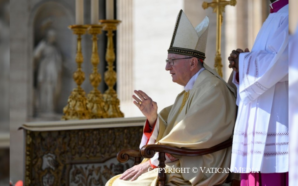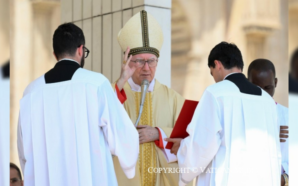The beatitudes (Matthew 5:1–12, Luke 6:20–26) are among the most treasured passages in the gospels. The beatitudes are both descriptive (true disciples are poor in spirit, meek, pure of heart, etc.) and normative (cultivate these attitudes). While counter-intuitive to the worldly, both then and now, they point to what Dietrich Bonhoeffer once called “the cost of discipleship.” Finally, the beatitudes are displayed by Jesus himself.
In many ways, Pope Francis’s whole life can be described as striving to live in accord with the beatitudes. Rather than a world-historical figure like Pope John Paul II or a reserved scholar like Benedict XVI, Pope Francis was, as college students like to say, “relatable.” He made serious mistakes of judgment (as in the Chilean sex-abuse crisis), offered ill-informed advice (as when he suggested that Ukraine provoked Putin), and manifested generational blind spots (especially regarding gender). At the same time, he was well served by his humble willingness to admit his own flaws, to listen to others (including those outside the clerical world), and to grow as a human being and Christian.
In a series of talks on the beatitudes given in 2020, Pope Francis urged his audience to view the beatitudes as a hermeneutical key to what it means to be a Christian. Taken together, these eight lapidary wisdom teachings inform his piety, pastoral activity, and moral sensibility.
Blessed are the poor in spirit, for theirs is the kingdom of heaven (Matthew 5:3). To be “poor in spirit” is neither the automatic result of material deprivation nor reducible to the sinner’s spiritual humility before God. As archbishop of Buenos Aires, the future pope came to know the “poor in spirit” among those who dwell in the shantytowns of Buenos Aires. They are “those who are and feel poor, beggars, in the depths of their being” (General Audience on May 20, 2020). Biblical scholars identify the “poor in spirit” with the anawim—an Aramaic term referring to people whose material destitution and vulnerability leads them to place all their trust in the boundless and unconditional love of God. To be “poor in spirit” is to realize that the kingdom of heaven—the state in which the world is in complete harmony with the absolutely loving will of God—is a completely gratuitous gift rather than something we can earn.
Rather than mere “objects” of either modern charity or social-justice advocacy, the “poor in spirit” teach us what it means to be truly Christian. What the pope asked of young people in the Philippines applies to all of us: “You who live by always giving, and think that you need nothing, do you realize that you are poor yourself? Do you realize that you are very poor and that you need what they can give you? Do you let yourself be evangelized by the poor, by the sick, by those you assist?”
Jesus is thus the concrete embodiment of what it means to be “poor in spirit,” and the Church must strive to grow in this spirit as well. This was the motivation for Pope Francis’s commitment to synodality and “accompaniment.” We must attend to those who are attuned to the voice of God because they have been forced to the peripheries of their societies.
Blessed are those who mourn, for they will be comforted (Matthew 5:4). Pope Francis’s interpretation of this passage revolves around the distinction between two kinds of “tears.” The first are the kind we shed when we are moved by the suffering or death of those whom we love. Christians should pray for the courage to face such suffering with one another rather than run away from it. The second kind of tears are those produced by the heartfelt realization of our own sinfulness. When asked “Who is Jorge Bergolio?” he simply said, “I am a sinner.” Realizing one’s sinfulness is itself a great grace because it allows us to repent and accept God’s forgiveness. Acknowledgement of one’s own sinfulness is painful, but we can endure it when we realize what Pope Francis never tired of proclaiming: “God always forgives.” This is why the pope insisted that the confessional is a place for receiving God’s mercy and not a torture chamber.
Blessed are the meek, for they will inherit the earth (Matthew 5:4). The third beatitude reminds us of Jesus’ invitation: “Learn from me, for I am meek and humble of heart” (Matthew 11:20). “Meekness” can refer to gentleness, kindness, and humility. In an eschatological sense, God will grant the “meek” who are now dispossessed a just world at the end times. Those who are faithful to God’s reign will not seize the land by force but rather trust that God will make good on his promise to create a world marked by shalom rather than mutual enmity. Pope Francis understood meekness as the antithesis of domination and violence. Marxists have criticized this valorization of meekness for suggesting that the poor should passively accept their fate. But Francis always insisted that meekness is consistent with demanding justice and respect for human rights. He thus endorsed “community resilience and empowerment” initiatives (goal 7 of Laudato si’), the grassroots mobilization of farm workers, laborers, and Indigenous people in Latin America and community organizing in the United States. The meek will inherit the earth at the end history, but this does not mean that now, in the middle of history, they should passively accept their dispossession.
Blessed are those who hunger and thirst for righteousness, for they will be filled (Matt 5:6). Psalm 107 declares that God “satisfies the thirsty and fills up the hungry,” but the fourth beatitude specifies the importance of yearning “for righteousness.” Jesus tells the disciples their righteousness must exceed that of the scribes and Pharisees (Matthew 5:20). His life and teachings show us the meaning of true righteousness, including fidelity, compassion, hope, patience, and the other Christian virtues. Pope Francis connects the fourth beatitude to his Ignatian conviction that every person, even those most distant from God, have a “hidden yearning for the light—some desire for truth and goodness—rooted in human nature and quietly evoked by the Holy Spirit. Whether they use religious language or not, the pope was confident that those who lead lives of integrity and justice are in fact cooperating with God.
Note that blessedness is not available only to those who are perfectly righteous (if there are such people), but more broadly to those who hunger and thirst for righteousness—both in themselves and in the world. Pope Francis’s own hunger and thirst for righteousness was displayed in his willingness to face and repent for his own shortcomings. Hunger and thirst for righteousness can sometimes be confused with self-righteousness, fanaticism, and judgmentalism. Francis came to repent of the harshness of decisions he made during his six years as Jesuit provincial and learned greater humility and compassion. He never stopped taking to heart Jesus’ denunciation of the Pharisees: “You who also on the outside look righteous to others, but inside you are full of hypocrisy and lawlessness” (Matthew 23:28).
Consider a few examples of Pope Francis’s path toward greater righteousness. After initially accusing Chilean survivors of clerical sexual abuse of “calumny,” he came to acknowledge the truth, admitted to his own “serious errors of judgment and perception,” and did everything he could to correct the situation. He demonstrated what it means for the Church to hunger and thirst for righteousness in July 2022 when he flew to Canada to meet with Indigenous people whose ancestors had been subjected to physical abuse, sexual violation, and “cultural genocide” in residential schools run by the Church. Rather than minimizing the damage the Church had done, he said, “I humbly beg forgiveness.”
Blessed are the merciful, for they will receive mercy (Matthew 5:7). The fifth beatitude resonates with Hosea’s iconic proclamation, “I desire steadfast love and not sacrifice, the knowledge of God rather than burnt offerings” (Hosea 6:6). Matthew’s later depiction of Jesus’ declaration of “justice and mercy and faith” as “the weightier matters of the law” (Matthew 23:23) touches the heart of Pope Francis’s pontificate. His papal motto was taken from St. Bede: “miserando atque eligendo” (“having mercy on and choosing [him]). Pope Francis describes God not only as “boundless and unfailing love” but also as “closeness, mercy, and tenderness.” The primacy of mercy accounts for why he cared so deeply about the homeless, the disabled, the frail elderly, and prisoners. Mercy lies at the heart of what it means to hunger and thirst for righteousness. This is why Francis described the Church as a “field hospital” and the Eucharist not as a “prize for the perfect” but as “a powerful medicine and nourishment for the weak.” Mercy also lies at the heart of his tireless advocacy for migrants. “It is hypocrisy,” the pope said to German pilgrims in 2016, “to call yourself a Christian and chase away a refugee or someone seeking help, someone who is hungry or thirsty, toss out someone who is in need of my help.” Mercy also lies behind Pope Francis’s endorsement of civil unions for gay people and his willingness to allow priests to bless gay couples.
Pope Francis urged his audience to view the beatitudes as a hermeneutical key to what it means to be a Christian.
Blessed are the pure in heart, for they will see God (Matthew 5:8). The term “heart” refers to the center of a person’s affections and thoughts whose quality is revealed in how he or she treats others. The operative Greek term here, katharos, refers to the state of being undefiled. Psalm 24 proclaims that those with “clean hands and a pure heart” are allowed to ascend Mount Zion. “Purity of heart” in this context refers to a profound internal moral integrity that gives rise to good deeds. We have no way to peer into the soul of Pope Francis, but we do find in his teachings and actions a deep commitment to personal integrity. He warned us to avoid the hypocritical tendency to condemn the speck in our friend’s eye while ignoring the plank in our own. He also worried about the superficiality of Catholics who reduce faith to going to Mass and do not seek any personal sense of God’s presence in their lives. Purity of heart is not a state of moral perfection. It is displayed in the tax collector’s repentance rather than the Pharisee’s pride (see Luke 11:18 and Matthew 6:5). Purity of heart lies in loving God and loving our neighbor in the right way. In his 2015 World Youth Day address, the pope urged his audience to act with unselfish love rather than hidden selfishness. Such love not only leads us to have reverence for one another but also draws us more deeply into the purity of God’s love—as Jesus himself promises that the pure of heart “shall see God.” Even in this life, those who seek to love with purity of heart already catch a glimpse of God’s love. As Pope Francis wrote in his 2018 apostolic exhortation Gaudete et exsultate. “A heart that loves God and neighbor (cf. Matthew 22:36–40) genuinely and not merely in words is a pure heart; it can see God.”
Blessed are the peacemakers, for they will be called children of God (Matthew 5:9). Pope Francis interprets the seventh beatitude as requiring a strong if not exceptionless commitment to nonviolence. His 2017 World Day of Peace message, “Nonviolence: A Style of Politics for Peace,” urges Christians to share his abhorrence of war and to resist injustice by mobilizing the transformative power of nonviolent activism. Three years later, his encyclical Fratelli tutti pointed out that “it is very difficult nowadays to invoke the rational criteria elaborated in earlier centuries to speak of the possibility of a ‘just war.’ Never again war!” Nevertheless, after Russia’s invasion of Ukraine in February of 2022, Pope Francis recognized that a country has a right to protect itself from military aggression: “To defend oneself is not only licit [but also] an expression of love toward one’s homeland.” At the same time, the pope noted that just-war ethics is used more often than not to give an air of legitimacy to unjust uses of military force. He also called attention to the fact that war always exacts the greatest cost on the poor. “When elephants fight,” one African aphorism has it, “the grass gets trampled.” Or closer to home, the American Civil War was called “a rich man’s war and a poor man’s fight.” Pope Francis deepened Catholic social teaching’s longstanding conviction that true and lasting peace is based in justice. Those claiming to wage a just war must not only conform to the ethics of entering a war (jus ad bellum) and waging it (jus in bello) but also, once the war is over, to repairing the devastation it caused (jus post bellum). This commitment led Francis to support the Church’s work on post-conflict reconciliation in Colombia, East Timor, South Sudan, and elsewhere.
Blessed are those who are persecuted for righteousness’ sake, for theirs is the kingdom of heaven. Blessed are you when people revile you and persecute you and utter all kinds of evil against you falsely on my account. Rejoice and be glad, for your reward is great in heaven, for in the same way they persecuted the prophets who were before you (Matt 5:10–12). This final and longest beatitude was intended to encourage early Christians who faced social ostracism on account of their loyalty to Jesus. The preceding seven beatitudes can be taken as building to this climax. Its importance is underscored by the fact that it is the only beatitude put in the second person, addressed to “you.” Jesus’ disciples may suffer now, but those who are steadfast will receive their reward when God’s rule is fully realized. Pope Francis took this beatitude—like all the others—to underscore the countercultural thrust of the Gospel. He invoked this beatitude to encourage Christians today facing some kind of unjust religious exclusion, persecution, or even martyrdom.
Gaudete et exsultate interpreted this blessing as encompassing all those who are ridiculed and punished for standing up for justice in a world that worships money, status, and power. Of course, Pope Francis himself cannot really be described as having been persecuted, but he was certainly reviled by some. His attempt to lead the Church toward becoming more welcoming, egalitarian, outward-facing, and pastorally sensitive drew not only fierce criticism but also personal attacks from social media and the traditionalist press. The pope’s landmark 2015 encyclical on ecology and social justice, Laudato si’, which put the weight of the Church behind the environmental movement, was strongly repudiated by proponents of neoliberal economics, the oil and gas industry, and climate skeptics. His 2016 post-synodal apostolic exhortation on the pastoral care of families, Amoris laetitia, inspired many Catholics but also provoked the wrath of some Catholic traditionalists. His strong advocacy for migrants earned him the hostility of Christian nationalists in Europe and the United States. Despite these strong headwinds, the late pope remained steadfast in his commitment to what is right.
The imperative in this beatitude—“Rejoice and be glad”—is especially appropriate for Pope Francis. We might even take mercy and joy to be the unifying themes of his work. They appear throughout his pontificate, from his early apostolic exhortation Evangelii gaudium to through his final Easter address on the joy of the Resurrection. Both themes are expressions of love: mercy is love directed at those who suffer, and joy is the fruition of love. Pope Francis constantly drew our attention to the beatitudes so that we might become more merciful and joyful Christians.
Stephen J. Pope is a professor of theological ethics at Boston College. He is the author of A Step Along the Way: Models of Christian Service (Orbis, 2015).
Reproduced with permission by Commonweal.








